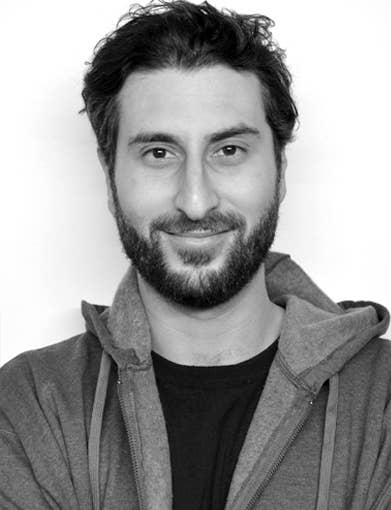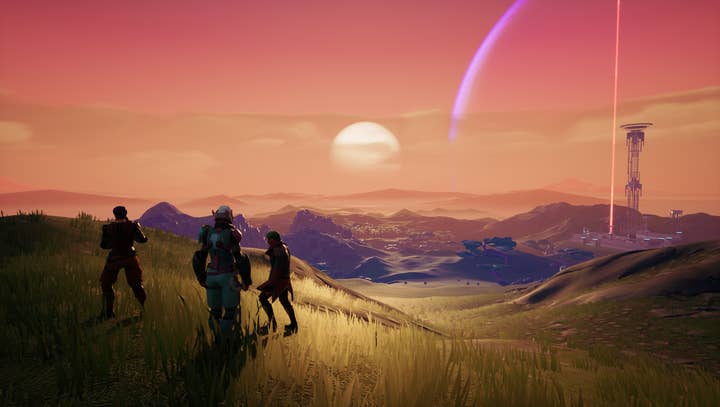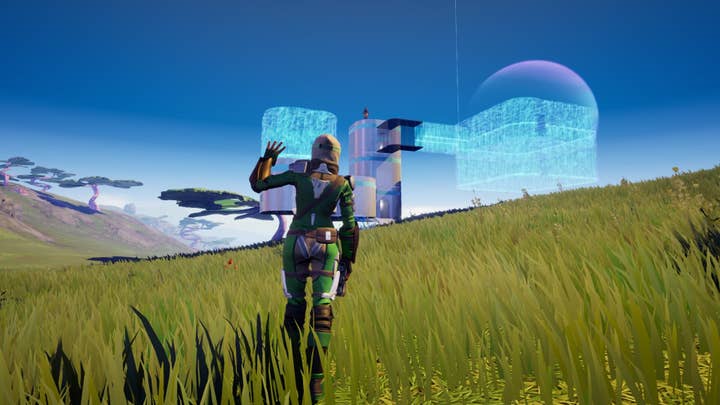Darewise: "We have a social responsibility" to provide alternatives to game violence
Why the former AAA developers are focusing on social interactions and collaboration in Life Beyond
"Sometimes you don't want to listen to the business case -- you just want to go with your gut."
Benjamin Charbit, co-founder and CEO of Darewise Entertainment, comes from a background of AAA development. He was game director for monetisation and multiplayer on Assassin's Creed IV: Black Flag, and worked on The Division with his fellow co-founder and CTO Samuel Kahn.
The business case for these two would be to make another AAA multiplayer game, one that plays to their strengths from the titles they previously worked on. But as their first project as Darewise progressed, their attitude changed.

Originally known as Project C, Darewise's debut game featured guns. Lots of guns. It featured player-vs-player (PvP) combat and, according to Charbit, branched into what he calls "wild PvP" where there are new rules.
"But the world is in the shape that it is today," he tells GamesIndustry.biz. "We started to feel some social responsibility to provide experiences that would be different. The Division, Assassin's Creed -- they're all amazing games, but it comes down to what you want to do for a living. Today, we all want to create super positive and super inclusive experiences."
It was a sentiment shared by other members of the team, who also have experience on AAA games such as The Witcher 3, Grand Theft Auto 5, Halo, Doom, and Mafia. The way Charbit tells it, the team essentially woke up one day and wondered what it would be live if they made a game that wasn't based around aggression.
"We have this background of making games that are pretty violent," he says. "But I think we know how to extract what can be fun from this and how to create a new flavour."
He continues: "We obviously want to have threats, but we want to have a positive experience. So the big challenge is how do you make that fun? Because players like instant gratification, and combat is great for that. But there are also great examples in cooperation. You can still create threats and still have an aggressive experience but without necessarily opposing players to each other. That's a big difference."
Charbit points to the ongoing success of things like The Sims, or the phenomenal popularity of this year's Animal Crossing as proof that developers can create something enjoyed by millions without relying on violence. The market is more open to such concepts, even though traditional AAA thinking disagrees.
"We started to feel some social responsibility. The Division, Assassin's Creed - they're all amazing games, but we want to create super positive and inclusive experiences"
"This is a really interesting time to take more chances and gamble more on your convictions, your beliefs -- instead of following a business plan that says 'Shooters are doing really well, so make a shooter.'" he says. "Let's try different things, because this time we don't have to spend $20 million before knowing if we're going in the right direction."
The result is Life Beyond, a sci-fi online multiplayer game that Charbit describes as "one of those new generation of MMOs with ambitions to turn it into more of a social space." It's a project that has certainly got the attention of investors, with Darewise securing €4 million in funding to date.
The game centres around efforts to colonise a new planet called Seren. Players work together to gather resources, fend off hostile alien creatures, and build a new society. The website hints that players can be rewarded for their contributions to this colonisation, but can also use the game as a space to "simply chill out with your friends."
The core of the game is not only exploration but also collaboration, with players able to specialise in certain areas but reliant on others to help complete projects. It sets an overall tone of cooperation, although Charbit says it "absolutely did not start there on paper."
Perhaps the biggest shift in the game's design direction was the complete removal of PvP. Originally, the game was planned with safe zones -- particularly around starting areas -- where weapons would do no damage.
Darewise was hoping to create a game that evoked the idea of an outer space frontier with a Wild West vibe -- "something like Firefly," says Charbit -- where the further you venture from the colony, the more dangers you encounter. Dangers that include other players.
"We have this background of making games that are pretty violent. But we know how to extract what can be fun and create a new flavour"
Again, this decision came down to what the developers wanted to contribute as human beings, the social responsibility they felt. For Charbit, that meant a game that brings people together rather than pitting them against each other.
"I miss my friends," he says, referring to the restrictions imposed during the pandemic. "I have friends living all over the world and we play Destiny. That's the only game we could play together, and for us, it's like going to a bar. We want to create a world where it feels the same, it's fun, engaging, and it's enjoyable on any device.
"A lot of the games we play with other people, we play just so we can be together. The core gameplay has to be good to keep you there, but maybe it's not the main driver."
He offers a more pertinent example: his 13-year-old niece, once a massive fan of Minecraft but now primarily playing Fortnite.
"She's not playing because she's obsessed with PvP battle royale," Charbit explains. "She plays because that's where she meets with her friends, and I respect that. Epic did a fantastic job. My point is that maybe we can provide more positive experiences to those young audiences, maybe they can be interested in something else because I'm sure they're not here just because they love shooting at each other. That's what's driving us today."
That's not to say the game will remain entirely without PvP opportunities. For all the developers' desire to create positive and social experiences, they recognise that some players will expect the ability to battle each other. But, crucially, these battles will be contained.
"PvP is awesome if you opt in for it," says Charbit. "I'm a big player of Rust, Ark [Survival Evolved] and games like that, but I can understand the frustration where if your mind is not ready for that kind of experience where you're going to get harassed, it's not enjoyable. That's why we want to contain it, and make sure players can opt in for it. So there will be special areas of the world where it will be allowed."

It would be easy to assume that Darewise has been operating in stealth since it first formed in 2014, but Charbit says that's not the case; the studio just hasn't been actively promoting itself or Life Beyond -- even though the game has been live for over a year.
Currently invite-only, the game is accessible to small cohorts of players who are assisting with directing its development. Every week, the studio hosts a workshop on its Discord server, with a dedicated audience of 4,000 players, to discuss new designs and test new ideas.
This has been instrumental in helping to find that core gameplay -- both on a moment-to-moment and a meta level -- that will keep people engaged for years without centring around getting better at killing things.
"Maybe we can provide more positive experiences to young audiences, because I'm sure they're not [playing Fortnite] just because they love shooting at each other"
"Very often it's the whole endgame, like getting the best equipment or taking on the most challenging boss or raid," Charbit says of traditional MMOs. "For us, it's very different. It's more about having this social existence, this social relationship. And for me, social always implies an economic goal or relationship. Being in a relationship with other people, sometimes for business -- that's also a social experience."
Another key aspect of Life Beyond's appeal is it's a single shared experience. Rather than having "the worlds of World of Warcraft," as Charbit puts it, there is only one shard for the game, meaning the colony that develops on Seren is the result of every player who ever logs into Life Beyond.
This is enabled through a partnership with Improbable, granting Darewise access to its SpatialOS technology. The studio has come up with its own proprietary tech Wiseworld to help build the game world faster, but SpatialOS will be the power behind Life Beyond's universe.
It's been a particular boon to the team given that Darewise still stands at around 40 people -- a mix of AAA developers and people from other industries, including people from TV and film production and companies as seemingly unrelated as Groupon. The latter is a prime example of the final differentiator for Life Beyond: a customer care culture that Charbit says goes beyond the typical games-as-a-service mentality.
The aim is to transform Life Beyond over time into something that "blurs the line between a traditional video game to something that goes beyond entertainment." The studio isn't ready to fully elaborate on this, but points to its former Groupon staff as a key factor in its shift towards a different mindset, where the developers are "not prioritising things on what we feel like doing, we're prioritising based on what the data is telling us."
"Something I find very frustrating when working with developers from the AAA games industry is they're not very good at listening to players," Charbit explains. "They also never like to call them customers, they call them players. Because as soon as they complain about their players -- that they're ungrateful, entitled and so on.
"When you run a restaurant and people complain that the food is shit, what are you going to say? Are you going to say they don't understand my cuisine, that they're just entitled? No, you're going to think about changing something. AAA developers are very bad at that, because it's not in our DNA. We have a creative vision and we're going to deliver that. We don't run things on data or community feedback because that service culture doesn't exist.
"Games-as-a-service tends to go there, but software-as-a-service is really there. When you're a software-as-a-service company, you call your users customers and you respect them, you treat them accordingly. You need them -- they don't spend money if you're not delivering a good service. So I love that culture, which is much more respectful of their time. Our players spend so much time in our games, we need to really be careful about what kind of experience we give them."
The combination of all these things not only means Charbit is confident about Darewise and its debut game, but also that he has "never been more satisfied" with the process of games development. Drawing on the iterative design processes demonstrated by Fortnite, the quest to find alternative, more positive gameplay experiences that don't centre around violence, and a determination to avoid the mistakes he perceives in how AAA treats its audience, Charbit can't imagine turning back.
"Whether you work on The Witcher, Assassin's Creed, Call of Duty, or The Division, it's always the same thing -- it's a fire and forget development, you move on to the next thing," he says. "Not any more for us."


